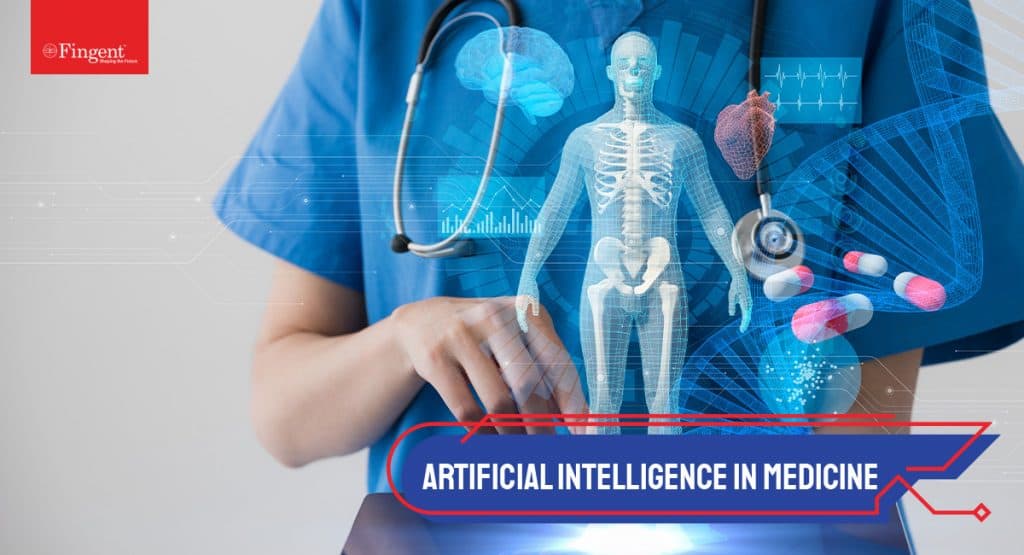AI in Healthcare Trends: What’s Trending and What’s Upcoming
There couldn’t be any better empirical evidence than COVID-19 to prove the transformational impact of AI on healthcare. Had AI not been there, it would be unviable to develop and distribute vaccines at record speed, empower public health officials and front-line workers, support equipment manufacturers, take critical life-saving actions, and respond to these abnormal times.
Leading pharmaceutical company Moderna relied on automated processes and AI algorithms to rapidly bring out their covid vaccine nominee for its first clinical trial. From an anticipated 15% chance of success, AI helped the pharmaceutical company lift their success rate to a whopping 50%, placing the vaccine efficacy levels close to 94.5%. AI’s role in healthcare isn’t limited to pharmaceuticals alone.
In this piece, we’ll see what AI holds in store for healthcare now and in the coming years.
Read more: AI in Medicine – Yesterday, Today, and Tomorrow
Top Applications of AI in Healthcare
Over these years, AI has brought more sophistication into what humans do, particularly in segments like healthcare. Here’re a few AI healthcare transformations currently underway:
1. Allows People to Stay Fit
AI and the Internet of Medical Things (IoMT) have helped launch several consumer health applications and self-health monitoring devices such as wireless-enabled wearables, activity trackers, pedometers, smartwatches, and other physical fitness monitoring gadgets. These healthcare technology applications encourage people to take proactive measures for maintaining a healthy lifestyle and allow consumers to be in control of their health and well-being. Similarly, healthcare professionals can rely on AI to better understand what their patients need. With insightful patient data, caregivers can provide the necessary guidance and support, thereby enabling people to stay healthy.
2. Early Disease Detection
It’s well established that the early detection, screening, and treatment of cancer can improve outcomes. American Cancer Society is successfully using the cloud ML engine on the Google Cloud Platform to analyze breast cancer images with 12x improved speed. Advanced deep-learning models are being used to detect Diabetic Retinopathy (DR) during the early and asymptomatic stages. This helps save diabetic patients from the daunting issue of irreversible blindness caused by lesions on the retina. The proliferation of consumer wearables and self-health monitoring devices, combined with AI, allows doctors and caregivers to detect potentially life-threatening ailments at more treatable stages.
3. Medical Diagnosis
The market value of global AI in medical diagnostics is estimated to be worth $3988.0 million by 2026. Leading AI platforms such as IBM Watson Health and Google DeepMind Health enable a large number of healthcare organizations to unlock massive amounts of clinical data to boost medical diagnosis.
Combining machine learning and neuroscience, AI helps build powerful neural networks that are capable of imitating human abilities. Watson can review and store huge volumes of medical data scattered across journals, seminars, conferences, treatment case studies, and umpteen other sources. AI’s ability to ingest enormous amounts of data, decipher images, and discover hidden patterns escaping even the most-canny human eye are expected to significantly transform healthcare in the near future.
Read more: Deploying Digital Twins in Healthcare
4. Clinical Decision-making
In the past, clinical decision support systems (CDSS) were fed by inaccurate datasets that led healthcare professionals to make flawed assumptions. Diagnostic errors are one of the top reasons behind higher mortality rates and prolonged hospital stays. Thanks to AI, ML, and the growing volumes of real-time clinical data gathered from numerous healthcare apps and devices. Clinical decision-making is now more precise and efficient with the emergence of AI-powered CDSS.
Sepsis Watch, a deep learning tool installed in the emergency department of the Duke University Health System has considerably lowered sepsis-induced patient deaths. The tool flags sepsis patients who are at medium to high risk, allowing doctors to identify early signs of sepsis. Not only does AI reduce diagnostic errors, it also suggests the best practices for post-surgical care and patient discharge, as well as recommends medications and follow-up checks to optimize patient care.
5. Medical Research and Training
The average cost of bringing a pharma product to the market is exploding year over year. Manual R&D processes and the time taken to conceive, design, and conduct clinical trials slow down drug production and increase the costs involved. The latest advances in AI help streamline drug research and discovery and reduces the time to market for new drugs. Researchers can use AI-enabled simulations on their devices to explore the impact of new therapies or medicines, thereby reducing the risk of testing in live conditions.
AI allows training and quick catch-up sessions to be held from anywhere, even after a medical resident leaves the campus post a tricky clinical case. AI-powered chatbots can answer queries on the fly, at any hour of the day. With instinctive AI diagnostic support and a low level of supervision, the next generation of medical students will definitely rely on automated self-learning platforms.
Read more: How Virtual Reality Improves the Standard of Medical Education and Training
Most-anticipated AI Innovations in Healthcare!
Real-time data, technological advancements, and innovation are driving the industry forerunners to discover new AI opportunities in healthcare. Here’re a few healthcare AI innovations to behold in the coming days.
1. Address the Shortage of Physicians
Google is running experiments to develop transformative AI imaging and diagnostic tools that can assist clinicians and even address the dearth of talent in a possibly grueling situation (like the global pandemic). Further research is being held to improve the detection of breast and lung cancer, sight-threatening eye conditions as well as skin diseases.
2. Genomic Analysis
Research proves that 30% of individual health effects are congenital. All of us carry 4 to 5 million genetic variants, each of which can influence our health traits. The cost to sequence a genome and poor sequencing data have marred genomic analysis in the past, preventing clinicians from identifying genetic disorders and high-risk diseases at an early stage. Deep neural networks such as DeepVariant exhibits top-class accuracy in analyzing genetic variants and sequencing genome data.
3. Decentralized Clinical Trials
The advent of AI is helping medical researchers and pharma companies worldwide to reduce in-person assessments in clinics. Various digital endpoints, such as smartphones, healthcare software, wearable sensors, EHRs, video conferencing, and numerous physical fitness monitoring devices are being used to gather data with the patient’s consent. This has drastically shifted medical trials from clinics, thereby reducing the risk of compromised immunity, exposure to fatal viruses, respiratory or cardiac malfunction, and other lethal health risks. Decentralized clinical trials allow institutional and federal health boards to review existing processes, implement new regulations quickly, listen to feedback and concerns, take proactive steps, and make healthcare more accessible to everyone.
AI is Pivotal to Healthcare New Normal
Necessity commands invention. Over the past two years, we saw how healthcare stakeholders around the globe took efforts to harness AI technologies – for discovering new drugs, extending the capability of existing drugs, reducing the time to distribution, screening for COVID-19 symptoms, supporting clinical decisions, automating hospital operations, and so on. Key U.S. healthcare decision-makers surveyed by Intel stated that their trust in AI in processing medical records has increased by 67%. As AI gets infused into more crucial areas of healthcare, it’s important to earn customer confidence and comfort, and support from various stakeholders in the ecosystem.
Fingent custom software development experts helps develop innovative, AI-integrated, custom healthcare software applications to improve your competitive advantage, time-to-market, ROI, and clinical precision. As the world enters a new era of health, it’s important to choose the right technology partner that helps adopt the right technology at the right time. We have an eminent list of healthcare clients, including NHS, Novita Healthcare, Mundipharma, and Casenet, LLC among others.
Contact us to understand how we’re helping businesses build trust and deliver sustained outcomes by making the most of our experience and technology.
Stay up to date on what's new

Recommended Posts

20 Jun 2025
Creating MCP Servers for Building AI Agents
AI was once limited to internal pilots—impressive in demos, but rarely tied to measurable business outcomes. That’s changed. Today, AI systems are being integrated into workflows that impact decisions, operations,……

05 Dec 2024 B2B
Benefits of Implementing AI Chatbots for Your Business
AI chatbots – do you need them? Think about this: How long would your customer wait to get the answer to a query? How long would it take them to……

03 Jul 2024 Financial Services
AI in Business: Preparing Leaders For The Revolution
AI in Business is a present reality! It’s a building revolution that is all-encompassing and is redefining business operations. You have only two options. Either ride on the crest of……

20 Jun 2024 Healthcare B2B
AI in Healthcare: Enhancing Patient Outcomes and Experience
Artificial Intelligence is a multi-talented assistant and has proven its worth in the healthcare industry. Healthcare organizations have found innumerable ways to use AI, from record maintenance to patient assistance.……
Featured Blogs
Stay up to date on
what's new






















































